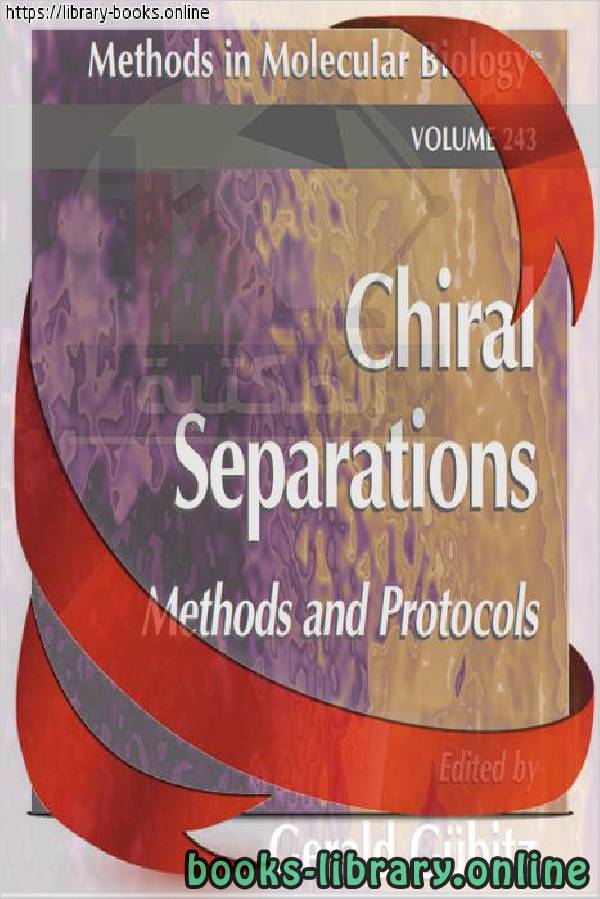📘 قراءة كتاب Chiral Separations_ Methods and Protocols-Humana Press أونلاين


Biologically
Biology is a natural science that is concerned with the study of life, its various forms and its function, how these organisms interact with each other and with the surrounding environment. The word biology in Greek is made up of two words: bio (βίος) meaning life. And loggia (-λογία) means science or study. Biology: the similarity of vegetation and animal cover on the edges of the African and American states, and the existence of the same fossil.
Branches of biology
Biology is an ancient science thousands of years old and modern biology began in the nineteenth century. This science has multiple branches. Among them are:
Anatomy
Botany
Biochemia
Biogeography
Biofisia
Cytology or cell science
Ecology or environmental science
نبذه عن الكتاب:
Gerald Gübitz and Martin G. Schmid
1. Introduction
The development of methods for chiral separation on an analytical as well
as on a preparative scale has attracted great attention during the past two decades.
Chromatographic methods such as gas chromatography (GC) (1), high-performance liquid chromatography (HPLC) (2–6), supercritical fluid chromatography
(SFC) (7–9), and thin-layer chromatography (TLC) (10–13) have been developed using different chiral separation principles. More recently, capillary electrophoresis (CE) (14–21) and capillary electrochromatography (CEC) (22–25) have
been shown to be powerful alternatives to chromatographic methods. Several
separation principles successfully used in HPLC have been transferred to CE and
CEC. For the separation of enantiomers on a preparative scale, LC has become
increasingly attractive.
The main domain of chromatographic and electromigration techniques is
obviously the separation on an analytical scale for enantiomer purity control in
synthesis, check for racemization processes, pharmaceutical quality control,
pharmacokinetic studies, etc. Chromatographic enantiomer separations can be
carried out either indirectly by using chiral derivatization reagents to form diastereomeric derivatives or directly using chiral selectors, which can be incorporated either in the stationary phase or the mobile phase. Similarly, in CE, indirect
and direct ways are possible, thereby, in the latter approach, the chiral selector
is simply added to the electrolyte.
CEC represent a new hybrid method between HPLC and CE. Accordingly,
the chiral selector can be present in the mobile phase or in the stationary phase.
Open tubular capillaries containing the stationary phase coated to the wall and
packed capillaries are used. A new trend is to move away from packed capillaries
Biology
Human biology
Who is the founder of biology?
The importance of biology
Areas of work in the field of biology
Theories of biology
Research on biology for the first grade of secondary school
Human biology
سنة النشر : 2003م / 1424هـ .
حجم الكتاب عند التحميل : 3.650 .
نوع الكتاب : pdf.
عداد القراءة:
اذا اعجبك الكتاب فضلاً اضغط على أعجبني و يمكنك تحميله من هنا:

شكرًا لمساهمتكم
شكراً لمساهمتكم معنا في الإرتقاء بمستوى المكتبة ، يمكنكم االتبليغ عن اخطاء او سوء اختيار للكتب وتصنيفها ومحتواها ، أو كتاب يُمنع نشره ، او محمي بحقوق طبع ونشر ، فضلاً قم بالتبليغ عن الكتاب المُخالف:
 قبل تحميل الكتاب ..
قبل تحميل الكتاب ..
يجب ان يتوفر لديكم برنامج تشغيل وقراءة ملفات pdf
يمكن تحميلة من هنا 'http://get.adobe.com/reader/'


 منصّة المكتبة
منصّة المكتبة 